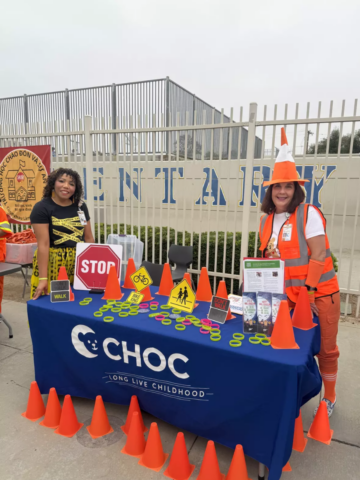Researchers in the lab of CHOC’s Dr. Raymond Wang, a metabolic disorders specialist, are making an impressive showing at a global gathering on lysosomal diseases (LSDs).
Six CHOC researchers, including Dr. Wang, director of CHOC’s Foundation of Caring Lysosomal Storage Disorder Program, will make podium presentations on abstracts on LSDs, rare genetic conditions that cause buildups of toxic materials that damage cells and organs in the body.
Also at the 2024 WORLDSymposium, Feb. 4 to 9, 2024, in San Diego, two CHOC researchers will present a research poster.
In addition, CHOC is part of another research project involving gene therapy in patients with GM1 gangliosidosis that has been selected for a podium presentation at the conference, the premier international gathering for specialists in lysosomal disorders.
“To have almost all of our abstracts get accepted for platform presentations is pretty cool,” says Dr. Wang. “We’re pretty jazzed about it.”
The best of the bunch
Abstracts are summaries of research projects. For research gatherings such as the WORLDSymposium, scientific review committees pore over hundreds of abstracts and select only the most interesting ones for podium presentations. Other studies are displayed in poster form.
The WORLDSymposium – the acronym stands for We’re Organizing Research on Lysosomal Diseases — has grown from a gathering in a small auditorium 22 years ago to one that now takes up three large hotel ballrooms, with some 2,000 attendees from more than 50 countries.
Dr. Wang first attended the conference in 2006 when he was a trainee.
WORLDSymposium is designed for basic, translational and clinical researchers, patient advocacy groups, clinicians, and others who are interested in learning more about the latest discoveries related to lysosomal diseases and the clinical investigation of these advances.
Researchers have found more than 70 types of LSDs. Although there are no cures for LDSs, treatments include enzyme replacement therapy, stem cell transplants and medications.
Here are brief summaries of CHOC’s podium presentations at the conference:
Dr. Wang –First in-human, intracisternal dosing of RGX-111, an investigational AAV gene therapy, for a 21-month-old child with mucopolysaccharidosis type I (MPS I): 3.5-year follow-up.
Caitlin Calhoun — Functional efficacy of transplanted, iPSC-derived, human neural stem cells in the brains of MPS I mice.
Jerry Fuad Harb –Exploring Pompe disease: Insights into the natural history of novel Gaac.1826dupA knock-in murine model.
Chloe L. Christensen — Restoration of acid-alpha glucosidase expression and function through efficient adenine base editing of Pompe disease variants.
Shih-hsin Kan — Improvement of hypertrophic cardiomyopathy in Gaac.1826dupA knock-in murine model with neonatal gene therapy.
Allisandra Rha –Prime editing corrects the Gaac.1935C> A pathogenic variant in infantile-onset Pompe disease mouse myoblasts.
Poster Presentation– Audrey Kao and Huiyi Harriet Chang, co-authors,“A long-term observation of ophthalmology assessment in atypical CLN2 patients receiving ICV cerliponase alfa treatment.”
Rising profile
CHOC’s profile is rising when it comes to rare disease metabolic research.
Last year, in a prestigious win for the CHOC Research Institute, Dr. Wang was awarded a $3.2-million National Institutes of Health (NIH) research project grant (R01) from the Eunice Kennedy Shriver National institute of Child Health and Human Development to advance gene-therapy treatment for mucopolysaccharidosis type I (MPS I).
And CHOC recently was selected as the pediatric site in a new statewide effort led by UC Irvine to accelerate the development of promising stem cell and gene therapies and expand patient access to them through clinical trials.
That five-year, $8-million grant from the California Institute for Regenerative Medicine (CIRM) designates UCI as one of CIRM’s Alpha Clinics.




